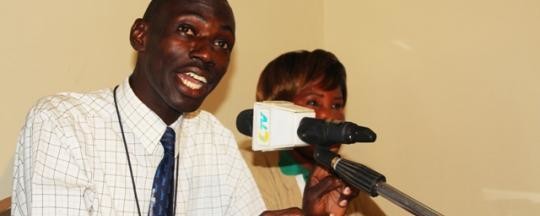A leading South Sudanese activist group says a recent proposal for the country’s warring parties to share power will sideline the civilian population.
The Intergovernmental Authority on Development (IGAD), the regional bloc which has mediated peace talks, this week proposed a new transitional government which if adopted would give President Salva Kiir’s administration and former vice-president Riek Machar’s opposition group the lion’s share of political positions and power in South Sudan.
The Juba-based Community Empowerment for Progress Organization (CEPO) said South Sudan’s civilian population would lose out in such an arrangement because they would be unable to influence political developments in their country.
CEPO Executive Director Edmund Yakani said the mediation framework should instead focus on persuading the warring parties to reach an agreement that empowers ordinary citizens, Radio Bakhita reported.
Yakani cautioned IGAD against squaring the peace settlement on power sharing among the elites at the expense of ordinary citizens. He said power sharing as a means to conflict resolution has proven to be a short-term solution in African conflicts.
Yakani suggested the mediators open space for holistic negotiations which give more voice to South Sudanese civilians.
Parliamentarians reject IGAD deal
Meanwhile, members of South Sudan’s parliament said Saturday that they would not accept the IGAD proposal, describing it as a reward for Machar’s rebels.
“This proposal does not bring any solution,” parliamentary speaker Manese Magok Rundial said. “It is adding more fuel to the conflict. It is dividing our people and we will not accept as the representatives of the people because we do not want our people to be divided. We don’t want to set a bad precedent.”
Aweil East MP Agany Deng Kawac opposed the deal because it would give Machar’s side more power in the three Upper Nile states, a first vice president position, and would maintain two separate armies during part of a transitional period.
Former caretaker governor Northern Bahr el Ghazal Kuel Aguer Kuel, who is not a member of parliament, also criticized the IGAD proposal, saying it is modeled off the 2005 Comprehensive Peace Agreement which led to South Sudan’s separation from Sudan in 2011.
Kuel warned that the current proposal sets a “dangerous precendent” that could lead to opposition-controlled areas breaking away from the rest of South Sudan.
IGAD has previously offered other power sharing deals, but none have been accepted by both of the two main warring parties.
Radio Tamazuj Photo: South Sudanese activist Edmund Yakani speaks in Juba
Related:
IGAD proposes new power sharing deal (12 Jun.)



